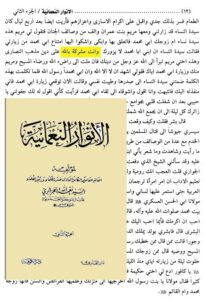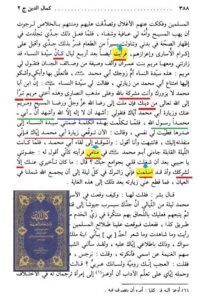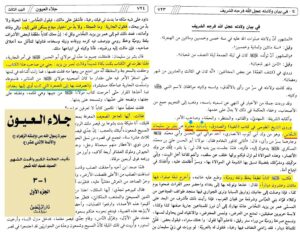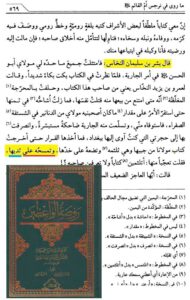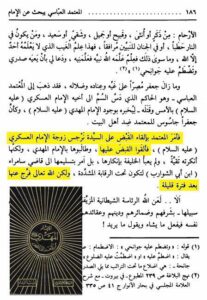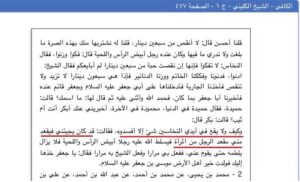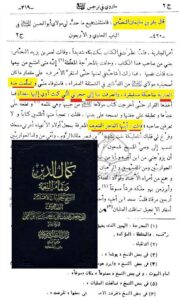In the name of Allah, and praise be to Allah, and peace and blessings be upon the Messenger of Allah, and thereafter:
The Twelver Shia believe in the existence of twelve Imams after the Prophet Muhammad, peace and blessings be upon him. These Imams are infallible and entrusted with guiding the Ummah and preserving the religion. The first of the Imams is Ali ibn Abi Talib, and the eleventh is Hasan al-Askari. Therefore, the twelfth Imam must be from his offspring, and it is not valid for them that he be a brother or a cousin, but strictly from the sons (مرجع1), but he had no children (مرجع2), and this undermines the foundation of Shia belief. Thus, they had to invent a fictional character, claiming he had a mother (Narges), who supposedly gave birth to him, and then he disappeared into a cellar in Samarra, awaiting his eventual return.
Thus arises the story of Narges, invented as his mother. The earliest source mentioning her is the book “Ithbat al-Wasiyya” by Al-Mas’udi, who died in 346 AH, 85 years after Hasan al-Askari.
Who is Narges?
According to Shia narratives, Narges is a Christian woman, the granddaughter of Caesar of Rome.
She dreamt of Fatimah al-Zahra’ accompanied by Maryam bint Imran. Maryam pointed to Fatimah and said: “This is the mistress of women, the mother of your husband, Abu Muhammad.” Fatimah then invited her to Islam, and she accepted Islam at her hand (مرجع3). Then Fatimah guided her to place herself among the captives, which she did, and she was captured and offered for sale.
Hasan al-Askari then appeared to her in a dream, and she asked him: “Why have you forsaken me, my love, after filling my heart with affection for you?” He replied that he had not visited her because she was a polytheist. From then on, he visited her every day in her dreams (مرجع4).
Narges was captured during a war between the Romans and the Muslims and was taken to the lands of Islam.
(مرجع5) Ali al-Hadi, the father of Hasan al-Askari, sent Bishr the slave trader, giving him a letter in the Roman language sealed with his seal, along with a pouch containing two hundred and twenty dinars. He told him: “Take these and head to Baghdad, and be present at the banks of the Euphrates on such-and-such a day. You will find ships carrying captives, and you will see slave girls being sold. Look for a man called ‘Umar ibn Yazid, the slave trader, and wait until a girl with certain qualities is presented. Give her the letter, and if she reads it and agrees, you are authorized to buy her.” Bishr said: “I did as my master instructed me. When the girl read the letter, she wept bitterly and told the slave trader: ‘Sell me to the owner of this letter.'” After negotiations, I bought her with the amount my Imam had given me. When I returned to my residence in Baghdad, she began kissing the letter and placing it on her eyes, cheeks, and chest (مرجع6).
After the death of Hasan al-Askari in 260 AH, Al-Mu’tamid the Abbasid detained Narges and demanded that she reveal the whereabouts of the Mahdi, but she denied his existence and claimed she was pregnant to avoid further searches. She was moved to Al-Mu’tamid’s palace and eventually fled to the house of Al-Hasan ibn Ja’far al-Nawbakhti (مرجع7).
After the death of Al-Mu’tamid and the ascension of Al-Mu’tadid, she was re-arrested and held in his palace until her death during the reign of Al-Muqtadir.
The Role of the Slave Trader:
Narges was transferred from one slave trader (a seller of slaves) to another. It is mentioned in the book Al-Kafi by Al-Kulayni that nothing falls into the hands of slave traders except that they corrupt it (مرجع8). This implies the corruption of Narges as well.
It is also said that the slave trader harassed the mother of the seventh Imam, Musa al-Kadhim ibn Ja’far, (مرجع9) Hamida al-Andalusiyya.
In the book Kamal al-Din by Al-Qummi, Bishr says: “I returned with her (Narges) to the room where I stayed in Baghdad (مرجع10).
If they accused Aisha, the Mother of the Believers, of immorality for being accompanied by a Companion when she missed the caravan, it is more fitting that Narges be accused of the same, as she was passed from one slave trader to another and spent nights in his room.
The Dispute Over the Name of the Mahdi’s Mother
There is a disagreement regarding her name. The most common name is Narges, but it is also said she was named Sighil, Malika, Susan, Rayhana, Maryam, Khums, Hakima, and Sabika. They reconciled these contradictory reports by claiming that all these names belonged to the same woman (مرجع11).
Conclusion and Advice
Narges, as is evident, is a fictional character, and likewise, her son, the Mahdi, is an even more fictional character. Among the criticisms of this story is that Narges stayed with the slave trader, and it is well-known that when a man and a woman are alone together, Satan is their third companion. It is asked: Why did Hasan and his father not go to buy her instead of sending a stranger? The free man is protective of his honor.
Since the story and the character are fictional, we are not required to speak to polytheists in ways that fuel their hatred of Islam, {Repel evil with that which is better; We are best aware of what they describe.}




